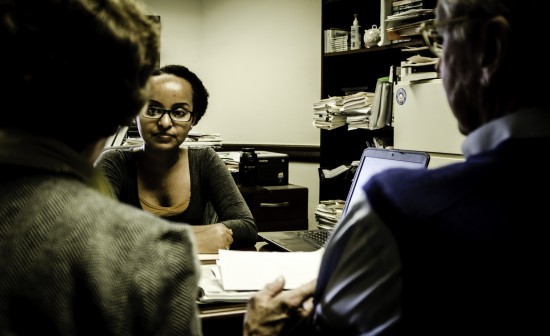How does MCI (mild cognitive impairment) affect the lives of those living with it? What’s a typical day for them?
That’s what Tigist Hailu, coordinator for Diversity in Research and Education at the Penn Memory Center, hopes to discover, using photos and in-depth interviews. “We want to understand the lives of older adults diagnosed with MCI by using photos as a tool to encourage conversation,” she said.
People with MCI, a disorder that affects as many of 20 percent of Americans age 65 and older, have a measurable memory impairment. Although studies suggest that they are experiencing the earliest symptoms of Alzheimer’s disease, “having MCI doesn’t mean you’ll get dementia. It could stay the same in a year, improve, or could decline to dementia,” said Hailu, who is also a part-time student in Penn’s Public Heath master’s program. “Close follow-up helps to sort this out.”
While this level of cognitive impairment is not as serious as dementia, it does affect instrumental activities of daily living, a term that describes the ability to do life’s daily tasks such as managing medications, cooking and taking care of bills. As part of the study, participants will take photos that “represent or reflect features of their every-day life that frustrate, assist or challenge their memory and the tools they use to overcome them,” she said.
Then, during one-on-one interviews, Hailu will question them about their captured images. For example, Tell me how you decided to share this photo with me. Can you tell me the story behind it? “Our goal is to get them to talk about every-day experiences with this diagnosis, gain insight into how they’re living with MCI,” she said. With the guidance of Carolyn Cannuscio, MD, of Family Medicine and Community Health, she will analyze her interviews to discover how participants live with MCI. The information will also help the Memory Center better understand the types of programs that might benefit these patients.
Another of the study’s goals is to raise awareness in the community about cognitive impairment. Hailu plans to put together an exhibit of the participants’ images and stories, as well as a photograph of each person taken by professional photographer Damari McBride, who is donating his time to take the photos and donating the images for the exhibit.
“Creativity is healthy; I believe about as healthy as laughter. Sometimes, creativity brings about laughter. This is a chance for these participants to tell you a story about something important to them in their own way,” McBride said in an interview with a photography blog.
She hopes to premiere the exhibit in May at the Perelman Center for Advanced Medicine and then at various churches and community centers in West Philadelphia. To stretch its impact beyond West Philadelphia, the images, portraits and stories will also be displayed on a website started by Jason Karlawish, MD, co-director of the Penn Memory Center.
The Penn Medicine CAREs grant she received has helped with the purchase of the cameras as well as costs associated with the interviews and community exhibitions.
So far, Hailu has recruited and talked with 12 participants. “One person took a photo of his phone that he uses to assist with memory. Another took a photo of her office desk to discuss challenges of memory at work,” she said. “Many photos show them with family members, reading, biking – routine activities of their lives.”
Feedback from participants has been positive. “People say the project has been therapeutic,” she said. One person said, “I’m excited about your project. It should have a positive effect on the public,” and that’s what Hailu hopes as well. She’ll graduate in May but hopes the project “will continue in raising awareness about an important public health issue.”
This article was originally published at www.pennmedicine.org.
